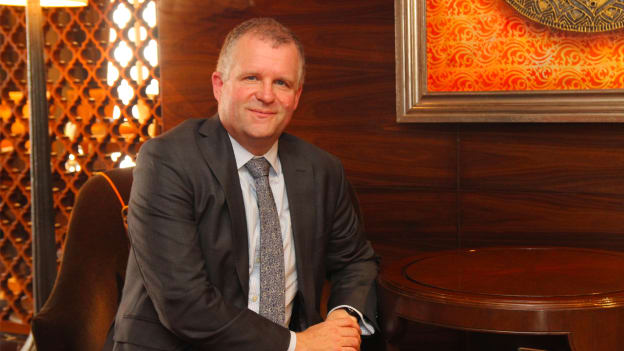Iain Martin on creating leaders for the digital era

Iain Martin, President and Vice-Chancellor, Deakin University has been lecturer and Consultant Surgeon at the University of Leeds and the Leeds General Infirmary.
An alumnus of the University of Leeds itself he went onto work as Professor of Surgery at the University of Auckland, New Zealand and then later was Deputy Vice Chancellor Academic at the University of New South Wales in Sydney, Australia.
Martin got appointed to lead the Deakin University, a few months back, in July 2019. He has almost two decades of experience and as an academician his learning has never stopped. Continuous learning is in fact the need of the hour and Martin believes that the leaders of today and tomorrow should never stop learning. They have to be more curious than ever before.
In an interaction with People Matters, Martin shares what it takes to be a successful leader in the digital era and how leaders can create a future-ready workforce.
What skills, behaviors and attitudes would leaders need, in this era of rapid disruption?
Probably the same skills that we’ve always valued in really good leaders but there are some of those skills that need more attention now.
- The ability to work well with a team and trust the team to ensure a greater diversity and variety while taking key decisions.
- A real confidence to deal with uncertainty combined with a humility that there are many gaps in the knowledge that leaders may have at a certain point of time.
- Patience; awareness that the plan they went ahead with might not work.
- Values. As the world of work gets more complex and multiple things impact each distinguished sector, there are certain foundational values that must lie at the core of every business decision. Leaders must be clear on these values.
Also, in today’s world the success of any business is now measured holistically. For instance, gaining more market share and doing business without harming the climate are both important metrics.
Leaders have to be bold enough and say, “No, we are not going to do that because that doesn’t align with the values of the organization.”
Lastly, what businesses need today is well-educated leaders, leaders who are aware not only about their own sector but leaders who have the knowledge of how developments in other areas may impact their business as well.
They need to understand what’s happening with big data, with artificial intelligence, and also gain a global perspective.
Can these competencies be taught? How can the education system or the curriculum be moulded to ensure that we are creating a future-ready workforce?
Education is not about teaching someone how to do a certain thing. It is more about putting them in an environment where those attributes and morals are valued and they see for themselves how they can benefit from it.
We have to create this environment for them and then they can work through and learn from it. In this journey, they discover their own leadership styles and their own personality also evolves.
I don’t encourage the idea that leaders are born. I have seen people who have made real conscious efforts to learn how to work, how to play to their strengths, how to work with a team and make a real difference.
To create more successful leaders, you not only need people who have all the necessary skills, but also an environment where they can thrive.
As leaders might have all the qualities but if they don't have the appropriate environment that supports their qualities they probably don’t exhibit those qualities.
Globally, what trends do you foresee shaping the future of tomorrow that you think the leaders should prepare for?
In the next two to five years, the way we use artificial intelligence will further evolve and impact more areas of work and sectors. Further, in the next five to ten years, some of the manufacturing technologies that are still being discussed or experimented will become a reality.
We are already witnessing dramatic changes in advance manufacturing, and 3D printing. Big factories might be scraped and there will be more of smaller factories, which are close to the point of supply to introduce smart manufacturing just in the time of delivery.
Robotics will continue to evolve and throw down some challenges. Leaders would have to follow these trends carefully as they will change the nature of work. Jobs will be redesigned and newer roles will evolve.
The world is already changing and for the best and the businesses have lots to gain from it.
Amidst all these technological changes, the one thing that will be super critical for the next generation of good leaders will be a consistent ethical behavior. As with technologies, there will be many challenges and also many temptations. The business leaders have to hold onto their values and use technology responsibly.
How can organizations prepare their workforce the ongoing rapid disruption?
To begin with acknowledge that investing in continuous learning is extremely critical. While it could be expensive, it is more cost effective in the long run.
Leaders don’t realize how counterproductive it is to let go of people who don’t have the skills for hiring new people who might have those skills. Instead, by making a little more investment in their current workforce they can create suitable talent for other new roles.
Further, leaders must identify some common areas which will impact their business and focus on increasing their employees’ awareness and knowledge in those areas.
For instance, a medium level manager at a retail organization must have an understanding of artificial intelligence. Many of the warehouses now are completely robotic or are largely robotic. Now, this manager doesn’t have to be an expert on AI but he should have some basic understanding to know how he can make of this technology to enhance his work.
As a leader yourself, how do you ensure that you are moving in tune with time and taking your team along in this learning journey?
Firstly, I am the leader of a great University that has a wide range of brilliant academicians.
So actually, I am bumping into thought leaders and change leaders every day. The great network allows me to talk to people who are involved with cutting-edge technology like AI, robotics and data science.
This is what I recommend as well - having a good network, peers and seniors from your domain as well as other will help you be more aware about the world of work. The more conversations you have with a more diverse group of people, the more you are able to learn.

















